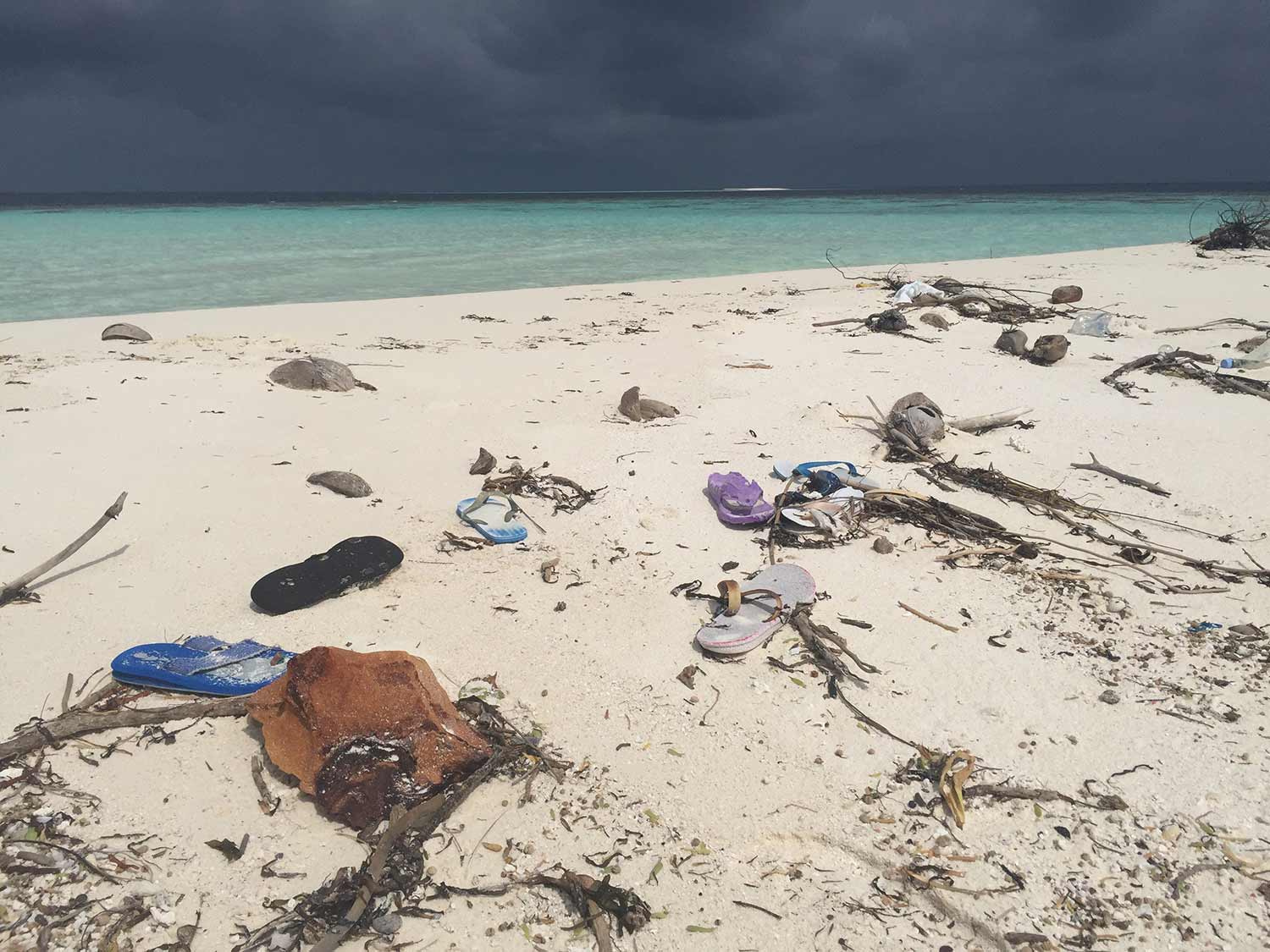Daily Business Report-Aug. 11, 2020
Even a small uninhabited island in the Maldives is marked with human pollution. The flip-flops on this Indian Ocean beach likely came from India or China, more than 1,000 miles away. (Photo courtesy of Stephen Mayfield)
UC San Diego forging a sustainable
future with renewable products
Cutting-edge science and new center for biodegradable
goods target environmental scourge of plastic waste
By Mario Aguilera and Cynthia Dillon | UC San Diego
Although they were introduced back in the 1950s, the true dawn of plastics is rooted in the 1970s. Along with disco and bellbottoms, the ’70s ushered in a meteoric rise in everyday consumer plastics. Single-use straws, product packaging, omnipresent water bottles and a range of modern household items went plastic during the decade.
Turn the clock forward to today. Humans have generated more than 6 billion metric tons of plastic waste. This trend is expected to skyrocket. At current rates, over the next 30 years we will see four times more plastic waste than we have to date, and within that time frame, we will dump 13 billion metric tons of virtually indestructible plastic waste into the environment.
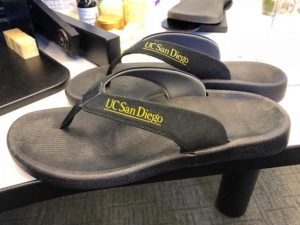
Realizing that our oceans will have more plastic than fish by 2050, a team of chemists and biologists at UC San Diego set up a new center for renewable materials on campus. Here, they align theory and practice to produce algae-based, commercial-quality polyurethane materials that give society a fighting chance at knocking out the perils of plastic pollution.
“In many ways, there is no future other than this,” said Biological Sciences Professor Stephen Mayfield. “The actual science behind this is not going to be nearly as tough to pull off as convincing people that this is what we have to do. Changing people’s habits is actually harder than doing the research and development.”
In recent years, UC San Diego has been home to noteworthy proof-of-concept prototype products that demonstrate the possibilities of tangible products made for a sustainable future. Look around the university to see biodegradable flip-flops with Triton logos or sustainable surfboards carving the waves offshore near campus.
In fact, UC San Diego is being positioned to be a world leader in materials science with recent funding of $18 million from the National Science Foundation to open another related center on campus—the Materials Research Science and Engineering Center(MRSEC).
___________________________________________
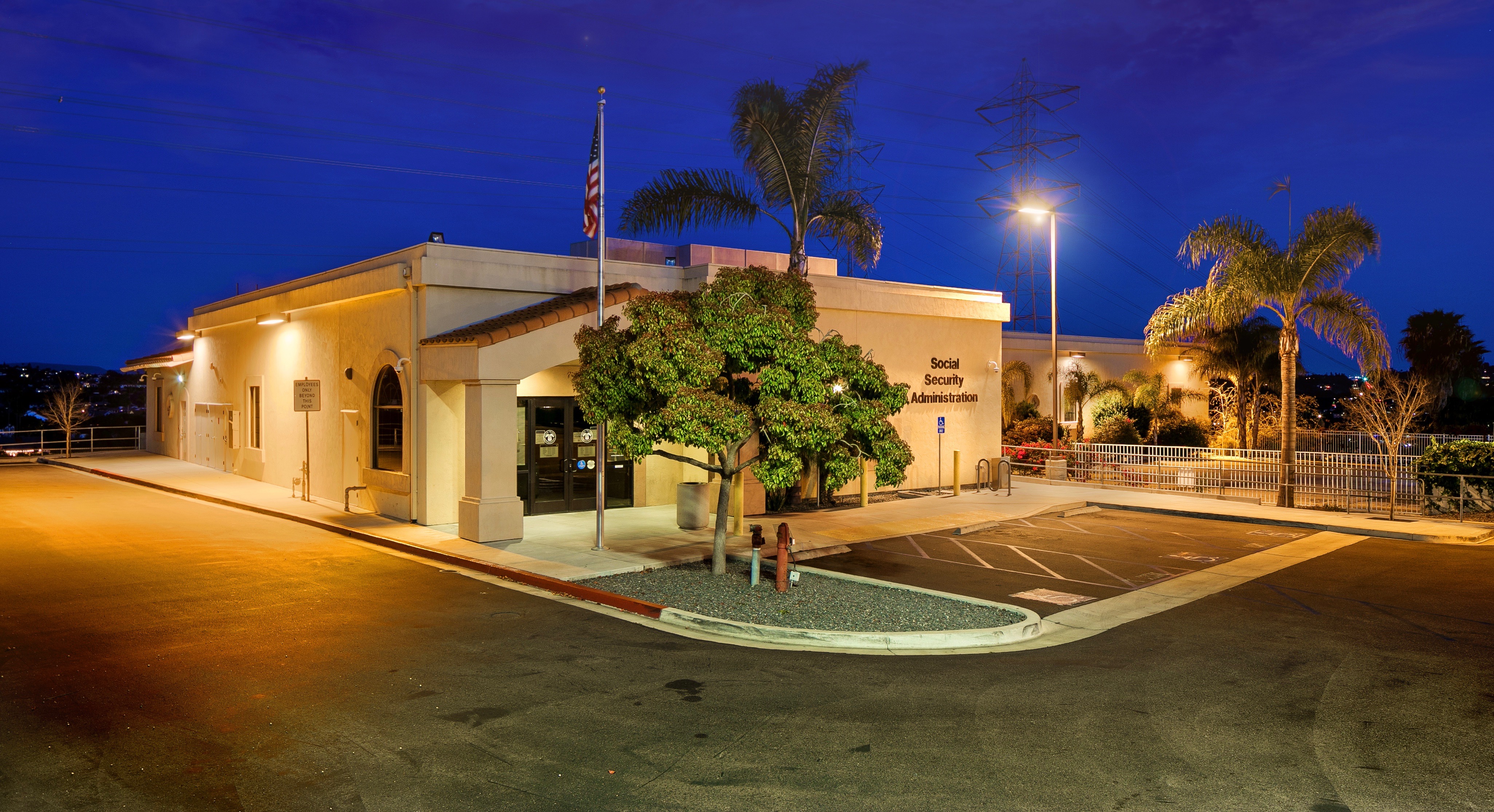
Oceanside office building sells for $6.65 million
An Oceanside office building leased to the Social Security Administration has been sold for $6.65 million or $493 per square foot to an Orange County-based private buyer.
Located at 2160 South El Camino Real, the 13,500-square-foot property is 100 percent leased to the Social Security Administration.
The property was built-to-suit in 2004 for the Social Security Administration and was fully remodeled and upgraded in 2018 to current U.S General Services Administration (GSA) standards. The upgrades included a new roof, HVAC system and solar system.
CBRE’s Matt Pourcho, Gary Stache, Anthony DeLorenzo, Bryan Johnson and Matt Harris represented the seller, a local private investor. The buyer was represented by an outside firm.
“This is an extremely stable asset, largely due to the United States government guaranteeing the lease through 2032,” said Pourcho. “This facility has recently been improved with over $3.4 million in tenant improvements.”
___________________________________________

General Atomics selected for U.S. Space Force
weather system prototype satellite program
General Atomics Electromagnetic Systems (GA-EMS) has been selected for the United States Space Force Electro-Optical Infrared Weather System (EWS) satellite program under the Space Enterprise Consortium.
The San Diego company will design and manufacture a prototype spacecraft, integrate the EWS payload and provide on-orbit mission control services to support the collection of theater weather imagery and cloud characterization data for worldwide military operational use.
___________________________________________

Director of California’s public health department resigns
The director of California’s public health department resigned late Sunday night, less than a week after state officials reported a tech glitch that resulted in an undercount of coronavirus cases and confusion about the scope of infections as the state’s death toll crossed 10,000.
Dr. Sonia Angell didn’t state a reason for her departure. She is the second high-ranking official to leave the department in two months, raising questions about how the state plans to handle a critical moment in the pandemic while addressing data snafus and communication problems.
Dr. Mark Ghaly, the state’s health and human services secretary, said Fridaythat neither he nor Gov. Newsom knew about the backlogged tests until after a press conference at which the governor reported a steep decline in the state’s seven-day positivity rate, likely due in part to the undercount. But the state Department of Public Health had warned local health departments about the data problems as early as Aug. 1, two days before Newsom’s press conference.
___________________________________________
New molecule reverses
Alzheimer’s-like memory decline
A drug candidate developed by Salk researchers, and previously shown to slow aging in brain cells, successfully reversed memory loss in a mouse model of inherited Alzheimer’s disease. The new research, published online in July 2020 in the journal Redox Biology, also revealed that the drug, CMS121, works by changing how brain cells metabolize fatty molecules known as lipids.
Over the last few decades, Maher has studied how a chemical called fisetin, found in fruits and vegetables, can improve memory and even prevent Alzheimer’s-like disease in mice. More recently, the team synthesized different variants of fisetin and found that one, called CMS121, was especially effective at, improving the animals’ memory, and slowing the degeneration of brain cells.
In the new study, Maher and colleagues tested the effect of CMS121 on mice that develop the equivalent of Alzheimer’s disease.
___________________________________________
San Diego launching review of granny flat
permits for possible overcharges
The San Diego City Attorney’s Office has told two city departments they should review hundreds of granny flat permits to ensure water and sewer fees have been properly waived under state law. The office’s four-page opinion was issued Thursday, the same day inewsource reported the city was possibly overcharging fees on granny flats issued since 2017.
___________________________________________
GoSite closes $16 million
Series A investment round
GoSite, the platform helping small businesses transition their operations online, has closed its $16 million Series A fundraising round. The capital investment comes from a diverse group of investors and entrepreneurs who believe GoSite holds a unique position to provide small businesses with the technology needed to manage their business online.
GoSite provides a platform for small businesses that traditionally operate offline, such as landscapers, hair salons and auto repair shops.
With GoSite’s platform, these businesses can engage with customers more effectively online not just in the digital era, but in this unprecedented time when small businesses are being asked to close their physical doors.
___________________________________________
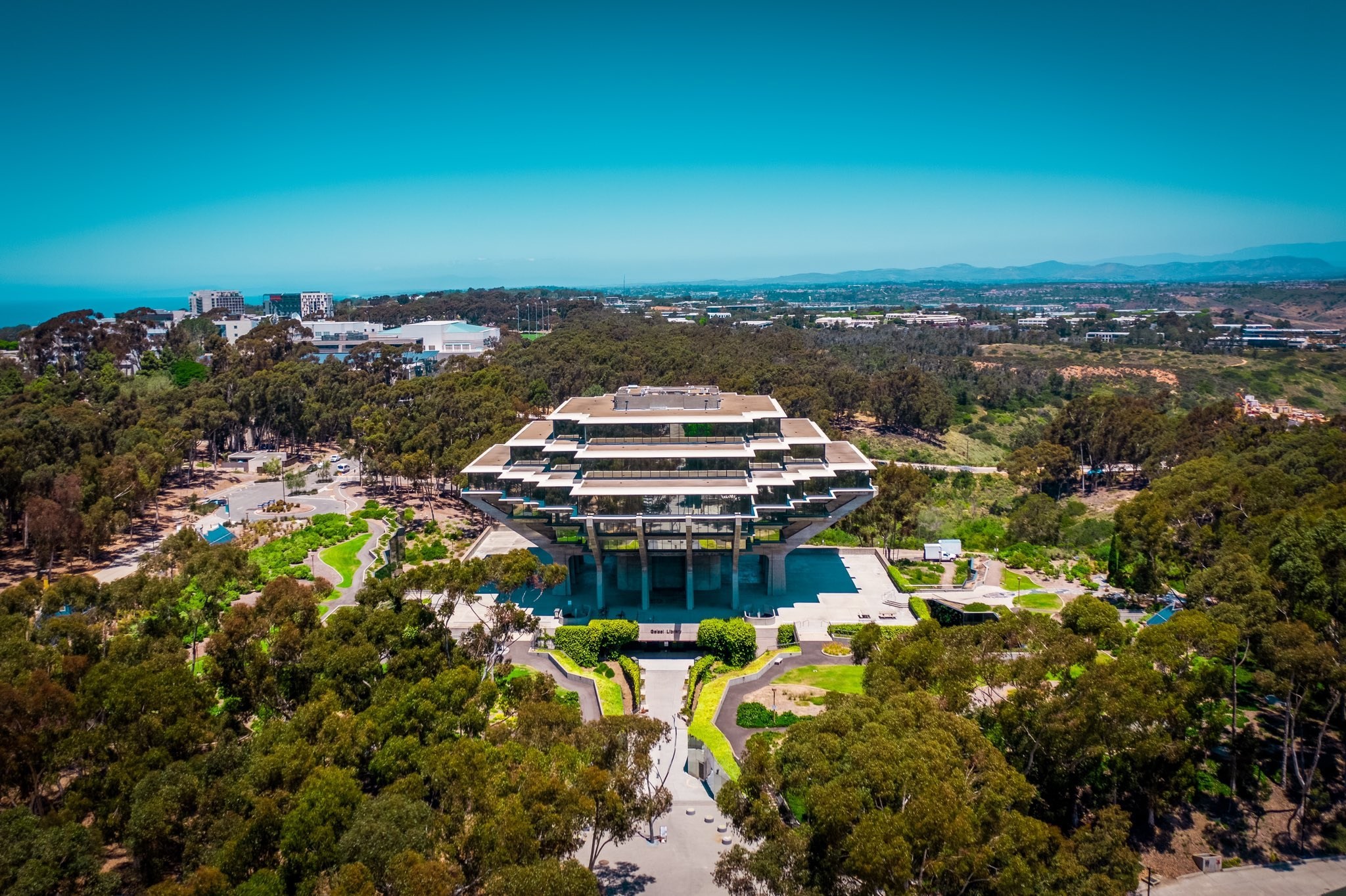
UC San Diego commemorates 50th
anniversary of Geisel Library
Beginning September 2020, the UC San Diego Library will observe the 50th anniversary of the university’s intellectual heart of campus, Geisel Library, which first opened its doors to the UC San Diego community and public in September 1970—then known as the Central Library.
To commemorate this momentous occasion, the library has planned a yearlong celebration aimed at recognizing the remarkable legacy of Geisel Library, UC San Diego’s most iconic architectural masterpiece.
Observances will include a series of signature events throughout the 2020-2021 academic year, including talks featuring acclaimed American authors Tara Westover and Kevin Young. In addition, the Library has launched a new website (geisel50.ucsd.edu) that includes a wealth of information on Geisel Library’s architectural design; significance on campus; historical milestones and pop culture appearances; event and exhibit information; and philanthropic opportunities.
___________________________________________
Hala Madanat named interim VP
for research at San Diego State
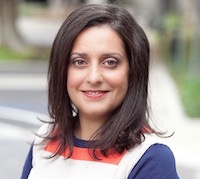
Hala Madanat, director of the San Diego State University School of Public Health, has been named interim vice president for research. Madanat’s appointment becomes effective on Sept. 1.
In her interim role, Madanat’s key responsibilities, in addition to her already extensive research portfolio, will be to expand and elevate the university’s research enterprise and creative activities. She will work closely with campus academic deans and vice presidents to also promote interdisciplinary work, innovative practices, as well as our newly defined strategic priorities.
Core-investigator of Institute for Behavioral and Community Health, Madanat’s research centers on addressing health disparities through community engagement. She heads the evaluation of several National Institutes of Health funded grants, and is the lead principal investigator of the $12 million NCI-funded SDSU/UCSD Cancer Center Partnership. For her important work and contributions, Madanat was selected for the 2020 Albert W. Johnson distinguished faculty award.
___________________________________________

S.D. Women’s Week Leadership Conference Goes Global
New virtual format with no boundaries features Daymond John, Linda Cureton, Ed Smart, Amy Trask
San Diego Women’s Week, celebrating 11 years of inspiring, empowering and connecting women is now virtual with leadership events for all ages and professions. Attendees enjoy virtual networking, keynote speakers, panel discussions, and more, all wrapped around creative solutions to everyday issues affecting leaders in the workplace and in their daily lives.
WHEN: Wednesday, Aug. 26 – Friday, Aug. 28, 2020
WHO: Keynotes for 2020 Leadership conference include:
- Daymond John from Shark Tank: Powershift, Transform Any Situation, Close Any Deal, and Achieve Any Outcome.
- Linda Cureton, Former CIO – NASA: Managing and Leading in a Tough Environment.
- Ed Smart, Father of Elizabeth Smart: Two Miracles, and Standing up for Yourself.
- Amy Trask, Former NFL Team Executive – Los Angeles Raiders: Leadership Vulnerabilities.
WHERE: Wednesday – Virtual Women and Wine 6-7:30 p.m.
Friday – Virtual Leadership Conference 8:30 a.m. – 6:30 p.m.
Click here for complete list of speakers and additional details.
___________________________________________

Federal consumer protections have been gutted;
it’s time for California to create its own agency
By Claudia Deeg | Special to CalMatters
It’s been more than four months since the World Health Organization declared COVID-19 a global pandemic.
Millions of us have lost jobs, are juggling caring for children at home or struggling to keep up with rent. Payday lenders are viciously targeting desperate consumers with loans with triple-digit interest rates – even as these businesses received billions of dollars in federal relief aid. ACE Cash Express, a payday lender, was cited by the Consumer Financial Protection Bureau for using illegal debt collection tactics, and two other California-based companies have been marketing these loans to California consumers.
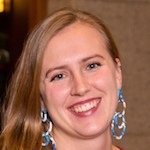
One would hope that amidst this crisis, the government would do everything in its power to protect consumers. Last week marked nine years since the Consumer Financial Protection Bureau opened. The bureau was created as a financial watchdogand generated nearly $12 billion in relief to consumers in its first six years. This agency should be working to stop predatory companies from using the pandemic to exploit desperate Americans.
However, the Trump administration has gutted the Consumer Financial Protection Bureau over the past several years, and the bureau recently rolled back critical regulations on payday loan lenders right when consumers need these protections the most. A new report from the U.S. PIRG Education Fund found that consumer complaints to the bureau have set a new record each month since the beginning of the COVID-19 pandemic in March.
We need a strong consumer watchdog to protect us during the COVID-19 pandemic, but the federal government is not going to provide one. So it’s time for California to step up.
California must create its own consumer protection agency, and this year we have an opportunity to do just that. Gov. Gavin Newsom has proposed creating the Department of Financial Protection and Innovation, a new agency that would protect consumers from threats including aggressive debt collectors, loan sharks and scammers.
The governor’s proposal would transform the Department of Business Oversight and establish the Department of Financial Protection and Innovation as a regulator with expanded oversight of companies, including debt collectors and credit reporting agencies. In many cases, the Department of Business Oversight, California’s existing regulator, lacks the authority necessary to promulgate rules and enforce state laws against companies using unfair, deceptive and abusive practices.
We cannot wait any longer. Stronger consumer protections were needed in California before the COVID-19 pandemic, but the surge in predatory lending and financial scamsconcurrent with the outbreak has made the need for better consumer and small business protections even more critical. Unfortunately, this proposal was left out of the initial budget passed in June, but legislators can still act on this issue in August.
Experts say that California’s economy is unlikely to return to pre-coronavirus levels in the next three years. That means three more years of unprecedented financial strain for consumers and uncertain prospects for small businesses. If we fail to establish the rigorous consumer protections needed to safeguard Californians, we will only prolong this crisis and leave more people in desperate situations.
We urge Newsom, Senate President Pro Tempore Toni Atkins, Assembly Speaker Anthony Rendon, and all California state legislators to fund creation of the Department of Financial Protection and Innovation in the 2020-21 budget. The economic pains caused by this pandemic are not going to end anytime soon, and so we must do all we can to care for and protect Californians.

